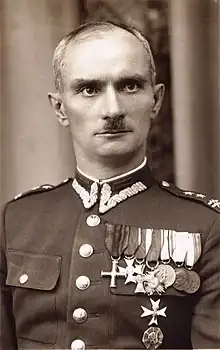Antoni Wereszczyński
Antoni Wereszczyński (17 December 1890 – 4 September 1953) was a Colonel in the Polish Army.
Antoni Wereszczyński | |
|---|---|
 Antoni Wereszczyński | |
| Born | 17 December 1890 |
| Died | 4 September 1953 Warsaw |
| Buried | Bydgoszcz |
| Allegiance | Polish Land Forces |
| Service/ | Artillery |
| Years of service | 1923–1953 |
| Rank | Colonel |
| Awards | Virtuti Militari Cross of Independence Cross of Valor Golden cross of merit |
Biography
Career
In 1923, he served in the 22nd Field Artillery Regiment in Rzeszów, Poland,[1] and in 1924 in the branch office in charge of the School for non-commissioned officers, while remaining an officer, serving in 22nd Regiment Light Artillery.[2] Four years later, he commanded the 1st Light Artillery Regiment of the legions in Vilnius.[3] In 1932 he served as Chief Officer in 1st Group of artillery Headquarters in Warsaw.[4] In June 1934 he was appointed commander of the 14th Light Artillery Regiment in Poznań.[5]
In August 1939, he commanded the 25th Regiment of Light Artillery in Kalisz,[6] then became Commander of the 25th Artillery Infantry Division.[7]
Death
In September 1939 he fought at "Bzura" and the Siege of Warsaw.[8] He was captured when Warsaw fell to the Germans, and was imprisoned in the German prison camp "Oflag in Marburg". Released in 1945, he returned to Poland and the Polish Army, where he served as Artillery Officer in Bydgoszcz in Pomeranian Military District.[9] He died on 4 September 1953 at hands of the communist Intelligence Service during a brutal interrogation in the Main Directorate of Information of the Polish Army in Warsaw. There is a symbolic tomb located in the Powązki Military Cemetery in Warsaw. His remains are interred in Bydgoszcz.
Ranks
- Captain – revised 3 May 1922 active from 1 June 1919
- Major – 18 February 1928 active from 1 January 1928
- Lieutenant Colonel
- Colonel
Decorations
- Silver Cross of War Virtuti Militari
- Cross of Independence
- Cross of Valor
- Golden cross of merit
- Medal Międzysojuszniczy "Medaille Interalliee"
References
-
- Rocznik Oficerski 1923 (1923 Officers' Yearbook), Ministerstwo Spraw Wojskowych, Oddział V Sztabu Generalnego Wojska Polskiego, Warszawa 1923 s. 757, 819.
- Rocznik Oficerski 1924 (1924 Officers' Yearbook), Ministerstwo Spraw Wojskowych, Oddział V Sztabu Generalnego Wojska Polskiego, Warszawa 1924, s. 678, 743, 1373.
- Rocznik Oficerski 1928 (1928 Officers' Yearbook), Ministerstwo Spraw Wojskowych, Warszawa 1928, s. 375, 457.
- Rocznik Oficerski 1932 (1932 Officers' Yearbook), Biuro Personalne Ministerstwa Spraw Wojskowych, Warszawa 1932, s. 182, 498.
- Personal diary of M.S. Wojsk. Nr 11 of 07.06.1934 r.
- Igor Błagowieszczański, Artyleria Wojska Polskiego w latach 1918–1939 s. 249.
- Piotr Bauer i Bogusław Polak, Armia "Poznań" ... s. 478.
- Ludwik Głowacki, Obrona Warszawy ... s. 342.
- Tadeusz Pióro, Armia ze skazą ... s. 72.
Further reading
- Roczniki oficerskie z 1923, 1924, 1928 i 1932
- Ludwik Głowacki, Obrona Warszawy i Modlina na tle kampanii wrześniowej 1939, Wydawnictwo Ministerstwa Obrony Narodowej, Warszawa 1985, wyd. V, ISBN 83-11-07109-8
- Tadeusz Pióro, Armia ze skazą. W Wojsku Polskim 1945–1968 (wspomnienia i refleksje), "Czytelnik", Warszawa 1994, wyd. I
- Igor Błagowieszczański, Artyleria Wojska Polskiego w latach 1918–1939, Wojskowy Przegląd Historyczny Nr 4 (71), Warszawa 1974
- Piotr Bauer i Bogusław Polak, Armia "Poznań" w wojnie obronnej 1939, Wydawnictwo Poznańskie, Poznań 1983, ISBN 83-210-0385-0